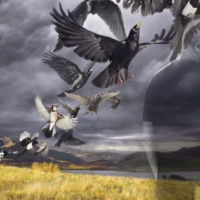Funny that most people finish their thoughts on outlaw country with Willie and Waylon.
Because if you’re talking outlaw — real outlaw; as in your basic leather-wearing, bad-attitude-having, stringy-hair-hanging, tat-sporting, law-breaking (did I mention, bad-attitude-having?), six-gun-waving, hog-riding, too-country-for-country-radio singing outlaw — David Allan Coe is your prototype.
He’s the kind of crazy-ass tough guy who would name an album “David Allan Coe or Else.” Really.
Yet, we never even call him by his name. He’s just the guy with The Song.
A shame, really. Coe, see, wrote other songs — namely Johnny Paycheck’s “Take This Job and Shove It,” and his own “Longhaired Redneck”; not to mention “Jack Daniels, If You Please,” which was memorably included in the film version of The Outsiders.
In fact, he has all his outlaw papers in order: There’s the early stint in an actual jail on actual death row. There’s being on the ground floor of a revolution in country music back in the 1970s. And later, there’s this near-mythical status in frat houses and dorm rooms nationwide.
The college rep built slowly, and purely on the merits of The Song: 1975’s “You Never Even Called Me By My Name” — a thing born to be screamed at the top of the lungs, arms around each other like drunken sailors. Burlesque, hyperbolic and more than a little perverse, it’s perfect both as satire and party soundtrack.
Subsequently, rock ‘n’ roll kids who wouldn’t recognize Tompall Glaser if he stubbed a cigarette out on their foot knew David Allan Coe. And that’s his legacy. After all the missed opportunities, the missing years, there’s The Song.
Born in September of 1939, Coe was an early talent. And not just as a singer, guitarist and songwriter. In fact, he’s appeared on some television specials as a magician and ventriloquist. Then, came a series of run-ins with the law. By his own count, Coe spent 20 of his first 34 years in prisons and reform schools.
No surprise, then, that Coe entered the Nashville scene as an outsider, and was relegated to pulling some early publicity stunts in an effort to get noticed. The most famous was hanging around outside the famed Ryman Auditorium during the Grand Ole Opry, parked in a hearse with his name painted on the side.
Coe took to wearing some pretty flashy outfits, as well. Which is how he came to be known, years before Glen Campbell had the hit, as the Mysterious Rhinestone Cowboy. (That’s what Coe called his debut album for Columbia, too.) A later association with Willie Nelson and Waylon Jennings proved he wasn’t just a sideshow item.
Yet they ramped up into superstardom, while Coe remained stalled as a largely faceless one-hit wonder. That’s not the way it started.
Early on, Nelson, Jennings and Coe were doing a concert. Each was exploring a new kind of country, a dangerous movement that stood in critical relation to the polished stuff coming out of Nashville. They mixed in rock ‘n’ roll, R&B and serious attitude. Bad attitude. They dealt with harder-edged themes. They were impolite.
It seems a local photographer took a picture at the show, and Coe’s back was turned to the audience. He was wearing a motorcycle jacket, and across it was stitched the name of the cycle club he was in: The Outlaws.
That picture hit the local papers, the story goes, and this new movement in country had a name — even if he didn’t.
Coe stayed on the road, and he put out some smaller-scale hit records. In fact, he was still making modest country splashes as recently as the mid-1990s when “The Ride” could be found on TNN’s very mainstream “Nashville Now” program. He still plays three to four nights a week.
Still, it all comes down to The Song. Always will.
“You Never Even Called Me By My Name” was written by John Prine and Steve Goodman. (Goodman also wrote “The City of New Orleans,” which was a hit for Nelson as well as Arlo Guthrie.) Prine and Goodman, it’s said, wanted to compose the “Best. Country Song. Ever.” — one that included every genre-based cliché. We’re talking pickup trucks, old hound dogs, love lost and long gone.
In the end, The Song — with its timeless intro: “I was drunk the day my mama got out of prison” — is far more famous these days than Coe himself. Its title, and this too sounds like a great country theme, has proven largely prophetic.
While he didn’t quite make it to fame and fortune (Coe memorably reminds us that we shouldn’t call him Waylon Jennings, Charley Pride or Merle Haggard), in the end, The Song made him.
Purchase: David Allan Coe – 17 Greatest Hits
- Nick DeRiso’s Best of 2015 (Rock + Pop): Death Cab for Cutie, Joe Jackson, Toto + Others - January 18, 2016
- Nick DeRiso’s Best of 2015 (Blues, Jazz + R&B): Boz Scaggs, Gavin Harrison, Alabama Shakes - January 10, 2016
- Nick DeRiso’s Best of 2015 (Reissues + Live): John Oates, Led Zeppelin, Yes, Faces + others - January 7, 2016


